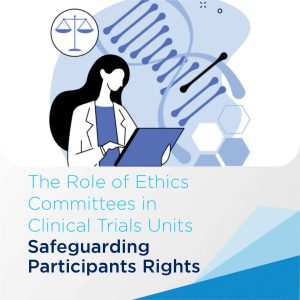Introduction:
Clinical trials play a pivotal role in advancing medical knowledge and improving patient care. However, the ethical considerations surrounding these trials are of paramount importance to ensure the safety and well-being of participants. At the heart of this ethical framework lies the crucial role of ethics committees in clinical trials units, acting as guardians of participants’ rights and welfare.
Ensuring Informed Consent:
One of the primary ethical considerations in clinical trials is obtaining informed consent from participants. Ethics committees meticulously review the informed consent process to ensure that participants are fully informed about the study, its risks, benefits, and alternatives. This scrutiny helps guarantee that individuals voluntarily choose to participate without coercion, fully understanding the implications of their involvement.
Balancing Risk and Benefit:
Ethics committees play a pivotal role in assessing the risk-benefit ratio of a clinical trial. They meticulously evaluate the potential risks participants might face against the benefits the research may bring to society. Striking this delicate balance is crucial to ensure that the potential benefits outweigh any potential harm, safeguarding the well-being of participants.
Protocol Review and Scientific Merit:
Before a clinical trial begins, ethics committees critically review the study protocol and assess its scientific merit. This rigorous evaluation ensures that the research is scientifically sound and has the potential to contribute meaningfully to medical knowledge. By upholding high scientific standards, ethics committees contribute to the credibility and reliability of the research outcomes
Ongoing Monitoring and Participant Safety:
Ethics committees are not merely involved in the pre-approval stages but continue to play a vital role throughout the duration of the clinical trial. They monitor the study’s progress, ensuring that any emerging risks or unforeseen complications are promptly addressed. This ongoing oversight emphasizes the commitment to participant safety and reinforces the ethical responsibility of clinical trials units.
Addressing Vulnerable Populations:
Certain individuals, such as children, pregnant women, and those with cognitive impairments, are considered vulnerable in the context of clinical trials. Ethics committees pay special attention to trials involving these populations, ensuring additional safeguards are in place to protect their rights and well-being. This meticulous scrutiny reflects a commitment to inclusivity and ethical conduct in research.
Transparent Communication:
Ethics committees foster transparent communication between researchers and participants. They ensure that participants are kept informed about any changes in the study, relevant findings, and potential risks that may arise during the course of the trial. This open dialogue promotes trust and underscores the ethical imperative of treating participants with respect and dignity.
Conclusion:
In the intricate landscape of clinical trials, ethics committees serve as ethical gatekeepers, diligently safeguarding the rights and well-being of participants. Their multifaceted role, from initial protocol review to ongoing monitoring, reflects a commitment to upholding the highest ethical standards in medical research. As we continue to advance scientific knowledge through clinical trials, the indispensable role of ethics committees remains central to ensuring that progress is achieved ethically, responsibly, and with the utmost respect for the individuals who contribute to medical advancements.








